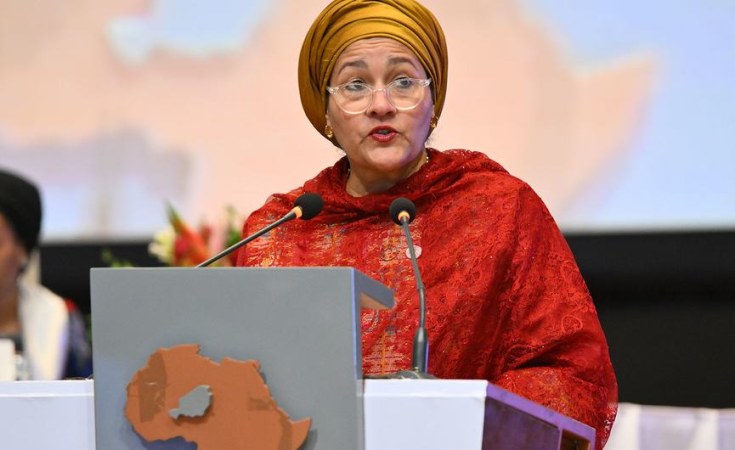Bonn — When global crises are interlinked, they overlap and compound each other. In such cases, the most effective solutions are those that work at the nexus of all these challenges.
In September, almost every Government on Earth will gather at the UN Sustainable Development Summit in New York to take stock at the halfway mark of the Sustainable Development Goals (SDGs) of what has been achieved and what remains to be done.
Despite some progress, global development efforts have been hamstrung by unprecedented environmental, social and economic crises, in particular biodiversity loss and climate change, compounded of course by the COVID-19 pandemic.
Tackling these interlinked challenges separately risks creating situations even more damaging to people and communities around the world, and exacerbates the already high risk of not meeting the goals and targets of the 2030 Agenda for Sustainable Development.
This is especially true because the myriad drivers of risk and damage affect many different sectors at once, across scales from local to global, and can result in negative impacts being compounded. For example, when demands for food and timber combine with the effects of pollution and climate change, they can decimate already degraded ecosystems, driving species to extinction and severely reducing nature's contributions to people.
The global food system offers another example of this negative spiral of interlocking crises - where food that is produced unsustainably leads to water overconsumption and waste, pollution, increased health risks and loss of biodiversity. It also leads to excessive greenhouse gas emissions, contributing to climate change.
Yet policies often treat each of these global threats in isolation, resulting in separate, uncoordinated actions that typically address only one of the root causes and fail to take advantage of the many potential solution synergies. In the worst cases, actions taken on one challenge directly undermine those needed to tackle another because they fail to account for trade-offs, resulting in unintended consequences, or the impacts being externalised, as someone else's problem.
This is why almost 140 Governments turned to the Intergovernmental Platform on Biodiversity and Ecosystem Services (IPBES) - requesting IPBES to undertake a major multiyear assessment of the interlinkages among biodiversity, water, food and health in the context of the rapidly-changing climate. This 'Nexus Assessment' is among the most complex and important expert assessments ever undertaken - crossing key biophysical domains of climate and biodiversity and elements central to human wellbeing like food, water and health. It will also address how interactions are affected by energy, pollution, conflict and other socio-political challenges.
To fully address this 'nexus', the assessment is considering interactions across scales, geographic regions and ecosystems. It also covers past, present and future trends in these interlinkages. And, most importantly, it will offer concrete options for responses to the crises that address the interactions of risk and damage jointly and equitably - providing a vital set of possible solutions for the more sustainable future we want for people and our planet.
One example of the mutifunctional solutions that will be explored is nature-based solutions - such as coastal wetland protection and restoration. When coastal wetland ecosystems are healthy - whether conserved or where necessary, restored - they are a refuge and habitat for biodiversity, improving fish stocks for greater food security and contributing to improve human health and wellbeing. They can also sequester carbon, helping to mitigate climate change, and protect adjacent communities and settlements from flooding and sea level rise.
To develop and implement these kinds of multi-functional solutions, responses for dealing with the major global crises need to be better coordinated, integrated, and made more synergistic across sectors, both public and private. Decision-makers at all levels need better evidence and knowledge to implement such solutions.
Work on the nexus assessment began in 2021 - with the final report expected to be considered and adopted by IPBES member States in 2024. A majority of the 170 expert authors and review editors from around the world are meeting in March in the Kruger National Park in South Africa to further strengthen the draft report, responding to the many thousands of comments received during a first external review period.
The assessment will also include evidence and expertise contributed by indigenous peoples and local communities - whose rich and varied direct experiences and knowledge systems that consider humans and nature as an interconnected whole have embodied a nexus approach for generations.
The Paris Agreement on Climate Change and the recently-agreed Kunming-Montreal Global Biodiversity Framework provide the roadmaps for tackling the climate and biodiversity crises. The IPBES nexus assessment will offer policymakers a practical guide to bridge the vital interlinkages across the two challenges, to other relevant frameworks, and link to the sustainable development agenda.
For more information about IPBES or about the ongoing progress on the nexus assessment, go to www.ipbes.net or follow @ipbes on social media.
Prof. Paula Harrison is a Principal Natural Capital Scientist and Professor of Land and Water Modelling at the UK Centre for Ecology & Hydrology, United Kingdom.
Prof. Pamela McElwee is a Professor in the Department of Human Ecology in the School of Environmental and Biological Sciences at Rutgers, The State University of New Jersey, USA.
Dr. David Obura is a Founding Director of CORDIO (Coastal Oceans Research and Development - Indian Ocean) East Africa, Kenya.
IPS UN Bureau
Follow @IPSNewsUNBureau


